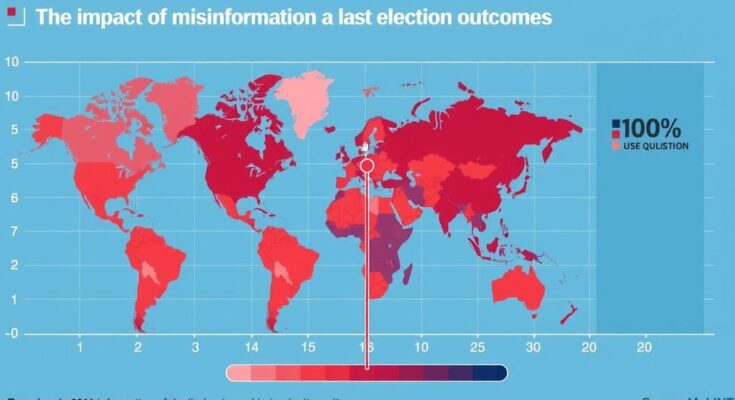In 2024, a record 3.7 billion voters participated in elections worldwide, highlighting the challenges of misinformation and foreign interference. Despite some studies indicating minimal impact on European and U.S. elections, notable incidents reveal vulnerabilities, such as the annulment of Romania’s results due to foreign influence. High-profile occurrences included AI use in Pakistan’s election and bomb threats in the U.S., underscoring the need for enhanced protections against electoral manipulation.
In 2024, a notable historic electoral year, an estimated 3.7 billion individuals across more than 70 countries participated in pivotal votes, which included significant elections in nations like the United States, India, and Indonesia. This year’s electoral processes highlighted the enduring challenges posed by misinformation, foreign influence, and generative artificial intelligence (AI). Despite Meta’s assertions downplaying the impact of generative AI on elections, multiple studies indicated that electoral outcomes in regions such as Europe and the United States were not substantially influenced by misinformation or foreign interventions. Nonetheless, severe repercussions were evident, notably when Romania annulled its first-round presidential election results due to foreign intrusion.
Several incidents during the year crystallized the profound consequences of misinformation and external interferences on electoral climates globally. In Pakistan, imprisoned former prime minister Imran Khan exploited AI to craft persuasive communications to his supporters, raising ethical concerns despite his legal incapacitation. As the European Union preemptively fortified its electoral infrastructure against misinformation, evidence surfaced illustrating attempts to compromise the integrity of voting processes. Moldova witnessed fluctuations in referendum outcomes, allegedly fueled by substantial Russian financial inducements aimed at swaying public opinion against EU membership. In the United States, bomb threats purportedly linked to Russian entities plunged polling stations into turmoil during critical elections. Romania’s electoral trajectory was irrevocably altered when a neophyte ultranationalist, propelled by disinformation efforts, claimed an unexpected victory but subsequently faced the annulment of results following intelligence revelations regarding state-sponsored interference. This series of events underscores the evolving landscape of electoral integrity in an age increasingly characterized by digital manipulation and foreign engagement.
The backdrop to these electoral occurrences is underscored by an unprecedented mobilization of voters in a landscape where misinformation presents significant threats. Following the extensive engagement in 2024 elections, the intensity of scrutiny surrounding disinformation campaigns has risen significantly. The intricate web of contemporary electoral participation reflects a complex interplay between domestic electoral integrity and the pervasive reach of foreign influence. The debates surrounding the legitimacy of the electoral processes in nations worldwide highlight the urgent need for effective measures to combat and mitigate misinformation and foreign meddling.
“Meta stated, ‘despite warnings about the risk of generative AI to elections, it seems these risks did not materialise in a significant way and that any such impact was modest and limited in scope.'” – Meta.
The elections of 2024 marked a significant moment in democratic practices globally, as voter turnout reached unprecedented levels amid rising concerns over misinformation and foreign influence. With billions of eligible voters participating from various nations, including those that are democracies and authoritarian regimes alike, the integrity of the electoral processes faced scrutiny like never before. Misinformation campaigns, particularly those employing new technologies such as generative AI, heightened fears of external manipulation, prompting defensive strategies from electoral bodies and governments worldwide. Events such as bomb threats illuminating vulnerabilities in the voting process and the annulment of results in Romania showcased the pervasive risk environment surrounding contemporary electoral politics.
The events of 2024 starkly demonstrated the heightened vulnerabilities in electoral processes influenced by misinformation and foreign intervention. While certain elections appeared to withstand significant destabilization, notable incidents signaled the urgent need for robust protective measures against manipulative tactics. The implications of these findings underscore the continual evolution of electoral challenges and exemplify the necessity for vigilance in safeguarding democratic integrity. The international community must engage in developing frameworks to mitigate the impact of misinformation and to uphold the sanctity of elections as democratic cornerstones.
Original Source: www.euronews.com




